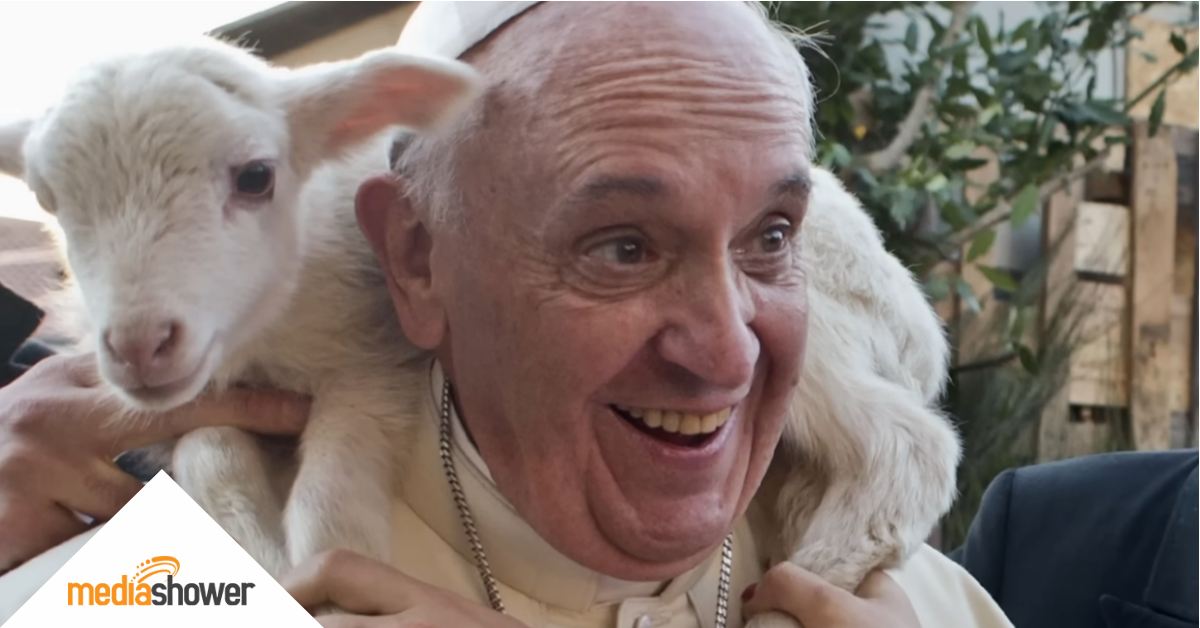
When Jorge Mario Bergoglio first appeared on the balcony of St. Peter’s Basilica in 2013, he didn’t deliver a grand pronouncement. Incredibly, he upended centuries of tradition when he bowed his head and asked the crowd to bless him.
In that moment of unexpected humility, something shifted in how we understand leadership. Francis was reimagining the role of the papacy in a way that took everyone by surprise, signaling a new tone of approachability in Church leadership.
This willingness to break with convention while staying true to deeper values defined Francis’s entire approach to communication.
His example offers marketers a rare blueprint: communication rooted in authenticity, service, and human connection.
The first papal address of Pope Francis.
Speaking the Language of Real People
From that first moment, Francis consistently chose simplicity over formality. His communication felt refreshingly human and earned him the nickname, “The People’s Pope.”
Francis spoke like someone you might meet at a neighborhood gathering, not like the head of a global institution.
Early in his papacy, he summed up his vision in plain words: “How I would love a church that is poor and for the poor.” An ordinary dream, voiced in an ordinary way.
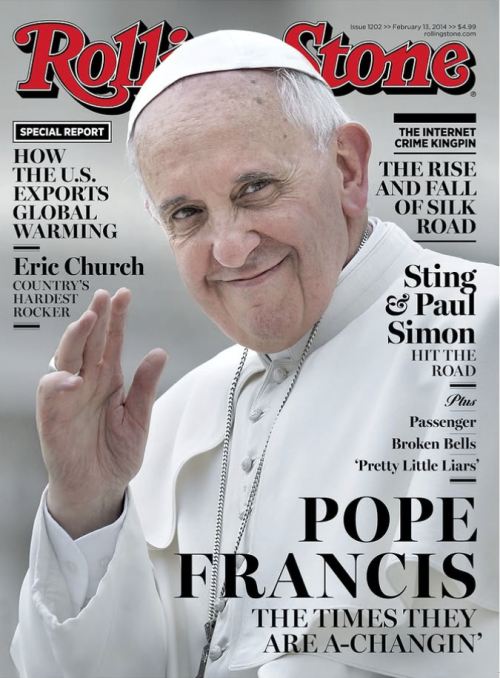
On the cover of the Rolling Stone, 2014.
When he spoke to seminarians, he didn’t soften his message. “Careerism is leprosy,” he told them. A few sharp words that left no room for spin.
He used the same kind of plain speech when he criticized bishops he felt cared more about appearances than people, calling them “airport bishops.” No one needed a theological degree to understand what he meant.
He stripped away the formalities that often distance leaders from the people they serve. Unlike any pope before him, he sought the input of laypeople in the governing of the church. In the process, he made the papacy feel personal again.
“This is what I am asking [of priests]—be shepherds with the smell of sheep.”
Living His Message
Francis never separated his words from his actions. They flowed together in a way that felt refreshingly whole.
Like the time he embraced a man with a rare disfiguring disease in St. Peter’s Square—not a staged photo op, but a natural moment of human connection.
Or when he visited the White House in his small Fiat, while giant motorcades of black SUVs lined the driveway. The contrast said everything his flock needed to know about his values.
The morning after becoming pope, Francis went back to his hotel, packed his own bags, thanked the staff personally, and paid his bill himself.
No one questioned his authenticity. Years before becoming pope, he had washed and kissed the feet of AIDS patients in a Buenos Aires hospice. The photos emerged later as evidence of a man who had been living his message long before the world was watching.
While most in his position lived behind layers of protocol, Francis’s simple acts revealed the heart of who he was, a man who cared deeply about building bridges, not walls.
Finding Joy in Imperfection
“A sense of humor is a gift I ask for every day. It lifts me up and helps me see things differently.”
Francis’s authenticity wasn’t limited to serious gestures. He also revealed himself through laughter.
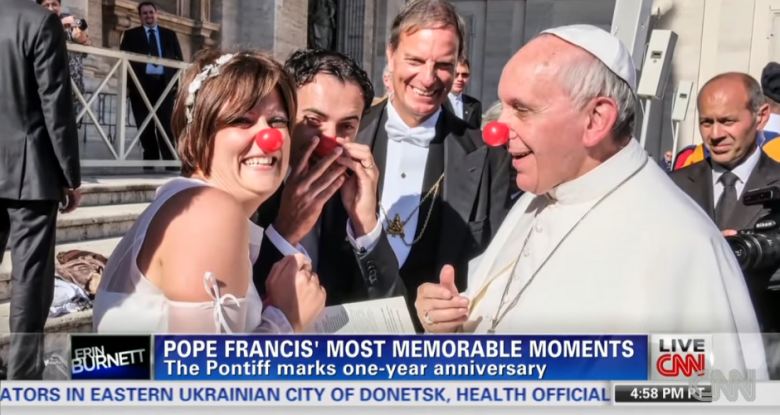
He had a well-known sense of humor, and enjoyed poking fun at himself. He always appreciated a good joke and told them often.
This comfort with imperfection made him approachable in a way few global leaders are. His humor created breathing room in serious conversations. It reminded everyone he spoke with that they were just people together, trying to make sense of a complicated world.
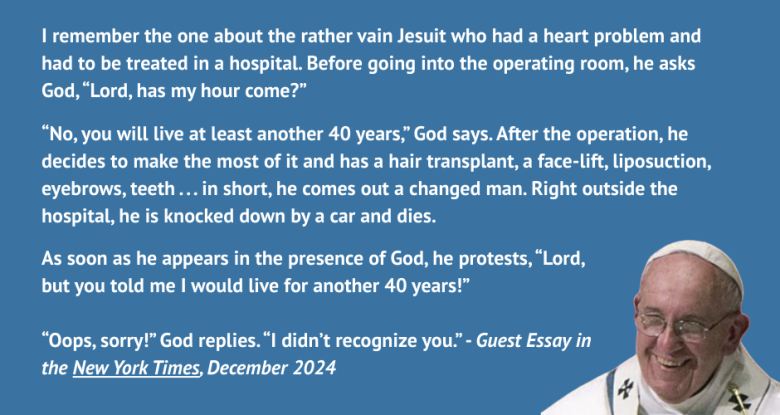
In 2024, he invited 106 comedians to an audience at the Vatican (including Americans Stephen Colbert, Conan O’Brien, Julia Louis-Dreyfuss, and Chris Rock). He thanked them “for getting people to think critically by making them laugh and smile.”
His laughter was contagious precisely because it was authentic, never forced or strategic.
Embracing the Full Range of Humanity
Francis openly encouraged a wide range of genuine emotions—even when they weren’t neat or predictable.
During public appearances, he often lifted children into his arms. Some laughed, others cried. He never recoiled from either reaction, recognizing that authentic connection includes both joy and discomfort.
He spoke often about the danger of becoming numb to suffering—of losing our ability to be moved by others’ pain.
“The world has lost the ability to weep. People have forgotten how to cry.”
Francis believed that emotional numbness wasn’t just a personal loss; it was a loss of humanity itself. To lead, to serve, or even simply to live fully, we must allow ourselves to feel deeply—both the sorrow and the hope.
In accepting people’s raw emotions without judgment, he offered a rare gift—the freedom to be fully human.
Expanding the Circle

His emotional openness naturally extended into how he approached inclusion. Francis consistently emphasized belonging.
From his earliest days as pope, he quietly insisted that no one stood outside the circle of belonging. He visited prisons and refugee camps. He met with survivors of abuse.
He called on nations to welcome migrants and displaced people, reminding the world that every person has the same dignity, regardless of where they were born.
When he spoke about immigration, he framed it not as a political issue but as a moral one—an extension of our shared humanity.
He spoke about the dignity of people society pushed to the margins—not in abstract terms, but through real, human connection.
When reporters asked him about gay priests early in his papacy, he answered with a simplicity that caught everyone off guard: “Who am I to judge?”
Five ordinary words. No theological framework. No institutional positioning. Just a human response that invited conversation rather than ending it.
“We must restore hope to young people, help the old, be open to the future, spread love. Be poor among the poor. We need to include the excluded and preach peace.”
Francis didn’t try to appear relatable; he simply was. In an era when most leaders hire teams to craft their image, he showed up as himself. He aligned what he believed, what he said, and what he did—without polish or performance.
When he spoke about serving the poor, he visited slums. When he talked about inclusion, he embraced those on the margins.
His integrity gave his words a rare credibility—and made the papacy feel inclusive in a way it hadn’t for generations.
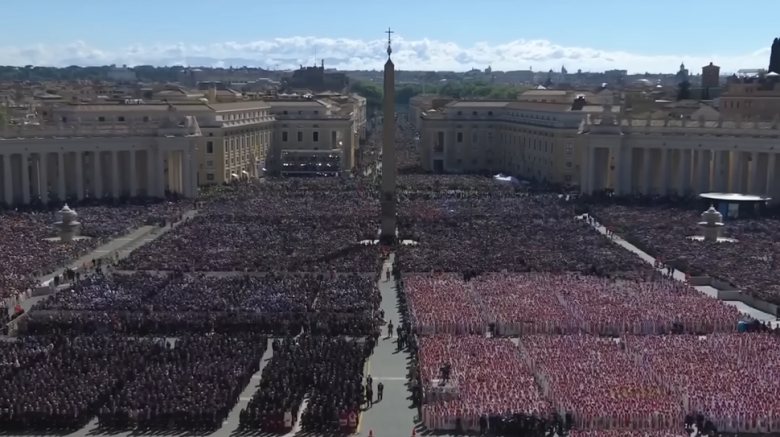
Tens of thousands of people paying their last respects at St. Peter’s Square.
– Source
A Legacy of Genuine Connection
Even when planning his funeral, Pope Francis stayed true to his convictions. The people he had chosen for his honor guard weren’t powerful or famous. They were the folks he genuinely cared about throughout his life: migrants, former prisoners, transgender people, and homeless individuals.
He had asked for a simple wooden casket and that his burial marker read only “Franciscus.” No titles or list of accomplishments, just his name.
Right up to his final goodbye, Pope Francis showed that real leadership flows not from position or status, but from decency and a genuine love for humanity.
His last communication to the world remained as humble and authentic as his first.
“The world tells us to seek success, power and money; God tells us to seek humility, service and love.”
– Pope Francis, 1936-2025
Marketer Takeaways
Anyone trying to reach others in a meaningful way can profoundly benefit from his example.
- Speak plainly. Ditch complicated language and communicate with authenticity and clarity. Clear, simple language resonates deeply.
- Show, don’t tell. Every action your brand takes is an opportunity to visibly communicate your values.
- Use humor strategically. Well-placed humor builds empathy and engagement.
- Be authentic, even when it’s uncomfortable. Don’t hide behind polished messaging; embrace imperfection.
- Empathy before strategy. Effective marketing starts from genuine understanding of your audience’s emotional needs.
Media Shower’s AI marketing platform empowers brands to communicate authentically, clearly, and memorably. Click here for a free trial.


